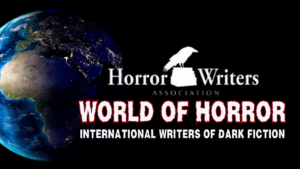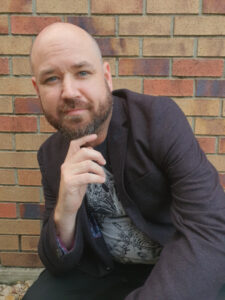World of Horror: Interview with Zachary Ashford

Zachary Ashford is the Aurealis-nominated author of When the Cicadas Stop Singing. His new book, The Morass: Servant of the Fly God is out through Crystal Lake on July 14. His debut novel, Polyphemus, follows through Darklit in September. He is an educator, occasional speaker, and cat-lover. He spends a lot of time hanging out with his wife, cats, and action figures. His books usually feature Australian characters, tonnes of page-turning conflict, and an assortment of lizard-people, killer marsupials, giant crocodiles, mutations, living dead things, sentient hive-mind flies, demons, and highway-patrolling serial killers. There’s usually a guy in a metal shirt too. You can buy his books in the usual places and on the modern hellscape we all call social media at:
https://twitter.com/ashford_zachary, https://www.instagram.com/zac_ashford/, and https://www.tiktok.com/@zacharyashford8. His website is www.Zachary-ashford.com

What was it about the horror genre that drew you to it?
For me, I think this is kind of a convoluted thing that’s the result of several influences in my life. First and foremost, is the influence of my surroundings when I was a young kid. I didn’t permanently move to Australia until I was twelve. In the years before that, I’d grown up in a part of the UK called the Romney Marsh. It’s a coastal agricultural area surrounded by history, moors, marshes and bordered by the English Channel. The old ruins, abandoned war fortresses, and the general landscape was inherently spooky. As a result, I was fascinated with the stories. The local folklore was full of references to smugglers, ghost ships, and the like.
That naturally became an attraction to the non-fiction books of monsters, mythology, hauntings, etc, and I was fascinated by that stuff. By the time I was reading those stories, seeing the kind of spooky movies (and in these early days, adventure movies) that were commonplace for a kid born in 82, my love of monsters was well cemented. The paperbacks Mum would bring home from the library were always a big drawcard – not so much the stories, but the covers – and I knew I loved them, even if I hadn’t read any.
When cereal started coming with Monster In My Pocket toys (around the time Goosebumps hit stores), I was fanatic about monsters and the like. Absolutely fanatic. When I later found out my nan worked at Fort Halstead, which was rumoured to be a place involved in UFO cover-ups in the UK – at around the same time as the X Files became big – it was a fait accompli. I was a tragic!
From there, it was quickly into the classic practical FX monster movies, heavy metal music, and horror and fantasy books. Even during the phases of my life when I haven’t been a ‘horrorhead’ I’ve always been drawn to monsters.
By the time we hit Australia and I was able to discover all of its ‘dangerous creatures’, I was well on the way to becoming a creature feature desperado, and really, nothing’s changed!
Is there a horror tradition in your country, in your culture? A taste for horror, a market? Not necessarily literature; perhaps oral tradition too.
I certainly think there’s a horror tradition here. I’m not particularly well-versed in the actual history of it, and I wish I knew more about it, but when you consider the sheer number of brilliant Ozploitation horror films from the 70s and 80s, as well as modern offerings, it’s something that’s been strong here. By the same token, some of our modern writers are kicking huge goals in the horror field. Obviously, you’ve got Aaron Dries and Gene Flynn taking so many award nominations, but the field is really rich and strong beneath that. When you meet up with the various writers’ groups, it’s amazing just how many talented people there are.
As for the market, I don’t think we have the market that the US or the UK has. Whether that’s because it’s a numbers game and our population is smaller, I’m not sure, but for a quick frame of anecdotal evidence, going into pop culture stores here, you’ll often find a void of horror merch, whereas in the States, I found it very easy to discover.
Who are some of your favorite characters in horror, internationally and/or in your own culture?
I’m assuming this is about fictional characters. So I’m going to run with it…
I could go on and on about this, but I’m such a huge nerd for this stuff that I’m surrounded by action figures, books, and shirts. I’ve got a huge soft spot for Chucky from Child’s Play. I just think he’s a great villain. Those movies are always fun.
From an Australian perspective, it’s really hard to go past Mick Taylor of Wolf Creek fame. He’s become the archetype Australian horror villain, but he’s incredibly effective because he borrows heavily from real-life serial killers that have left an indelible stain on aspects of our culture.
You only have to look at the Peter Falconio case or Ivan Milat to see how that played out in the 80s and 90s. I think it’s fascinating that Taylor has become such a well-recognised character, particularly when you look at Australia’s love affair with these roguish characters (and often murderers). There’s Chopper Read as a modern example, and then, of course, Ned Kelly.
Sorry, I really sidetracked there. For a horror hero? God, it’s so hard to actually think of one, but I bloody love The Thing, so I’ll go with Macready. Great character!
Do you make a conscious effort to include characters and settings from your country in your writing and if so, what do you want to portray?
Absolutely. I think it’s really important that we recognise the texts we create are products of our culture and our surroundings. It’s the only natural way for me to write what I write. Just recently, I’ve actually made the connection between two of my Novellas (When the Cicadas Stop Singing and The Morass: Servant of the Fly God) specifically being based in my home state of Queensland. I have a third on submission that also has that about it, and I’ve actually started to think of the three of them as something of a ‘Queensland Trilogy’. (Maybe I should try to market that to the regional papers hahahaha). All these books reflect different parts of our state, you’ve got the lush, tropical hinterland, you’ve got the desolate plains and isolated outback, and finally, you’ve got the coastal creeks and crocodile haunts.
As for what I want to portray, I think that I want to portray the ‘genrefied’ Australia that I see. I love that our country is known for these huge pockets of isolation and for deadly animals, but I think there’s space in all of that for heroes and villains, for triumphs and tragedy, and for some social commentary about the ways different things influence our decisions and our lives.
I’ve a huge fondness for the wilderness we have here, and I love to explore that, and I love to write a proper Ocker villain.
What has writing horror taught you about the world and yourself?
Tricky question. I think that I’ve certainly used it to exorcise some demons. Life’s not always rosy, and I think that horror is a great way to explore that and focus in on the struggles of life in a way that’s personal despite the huge scope of some of it.
I know that both of this year’s releases are books that are quite reflective of where I was at in the time of writing, and although I’m not usually big on happy endings, these are both particularly dark.
How have you seen the horror genre change over the years? And how do you think it will continue to evolve, both in the US and in your country?
Oh, man, if I could answer that well, I’d start a publishing company and capitalise on it!
In seriousness, I really think the opening of doors to the wider community has been powerful. I love that we’re seeing more and more diverse perspectives. I think that’s been huge.
As for where it goes in the future, I can only see it sprawling like an idiot god, sending its tendrils out into other newer genres and technologies to comment on all the things that are happening in the world and reminding us that darkness exists and that if we don’t stand up to it, we will be consumed.
How do you feel the International horror writing community has been represented thus far in the market and what hopes do you have for representation going forward?
I think that on a surface level, it’s represented pretty well. That’s got a lot to do with the internet as it makes online interaction much easier – even if here in Australia – we’re often tuning into events the morning after like some kind of big clean-up crew.
In person, it’s much more difficult. A lot of it is justifiably US and UK-based, and there are barriers there for people living internationally. Of course, these aren’t things that are easy to fix. It’s just the nature of the financial nature of needing to travel, network, etc.
Shy of big investment from bigger bodies, that’s just got to be the nature of things. And the reality is, we don’t want big investment from bigger bodies because it never comes without catches.
Who are some international horror authors you would recommend?
I’m going to read this as Australian authors I recommend. I’m also going to assume people know the big names.
For me, the first Aussie who comes to mind is Matthew R Davis. I just love his books. I think they represent a slightly different dark spot on the same side of Australia that I typically explore, but his work is so fluid. His prose is so good.
I really like DI Russell’s work. He’s got those pulpy sensibilities and a great mind towards mental health issues that comes from his professional experience. The result is excellent splatterpunk.
Obviously, you’ve then got a wealth of amazing writers working in these fields. Everyone from the widely celebrated Geneve Flynn to Claire Fitzpatrick (two talented writers I’m fortunate to share a city with), Aaron Dries, Alan Baxter, Kaaron Warren, JS Breukelaar, Greg Chapman, Garth Jones, LE Daniels…the list goes on. Anyone I’ve forgotten, I’m sorry!
What is one piece of advice you would give horror authors today?
Write what you’re passionate about. Consider your craft. Write with purpose. Take time to read as well!
And to the writers from your country out there who are just getting started, what advice would you give them?
Enjoy yourself. If you see it as something that probably won’t be very rewarding financially, but something that offers a lot of self-satisfaction, great experiences, and the opportunity to score some free ARCs, you’ll have a blast!



